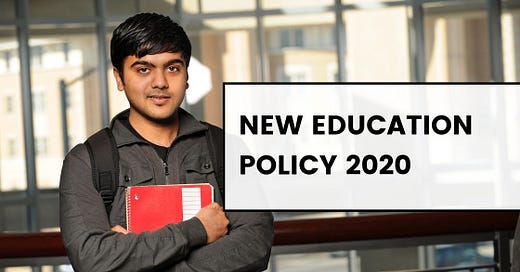The New Education Policy was approved by the cabinet on 29 July, 2020. It was a huge decision by the central government as it is proposed to change the previous education policy, 1986.
The main aim of the policy is to transform the education system of India by 2040. The National Education Policy 2020 envisions an India-centric education system that contributes directly to transforming our nation sustainably into an equitable and vibrant knowledge society by providing high-quality education to all.
There are various provisions that are discussed in The New Education Policy. Some of them are:
1. Language
The National Education Policy 2020 has emphasized on the use Mother tongue or local language as the medium of instruction till Class 5 while, recommending its continuance till Class 8 and beyond.
2. School education
The existing “10+2” system will be replaced by the “5+3+3+4” system.
Foundational Stage: It will cover 3- 8 years of children, where learning will be activity based.
Preparatory Stage: Classes 3 to 5, which will cover the ages of 8–11 years. In this stage various subjects will be introduced to the children like science, math, language, physical education, etc.
Middle Stage: Classes 6 to 8, covering children between ages 11 and 14. It will introduce students to the more abstract concepts in subjects of mathematics, sciences, social sciences, arts and humanities.
Secondary Stage: Classes 9 to 12, covering the ages of 14–19 years. Students are given flexibility to choose their subjects.
Coding will be introduced for the students from class six. Board exams will be replaced by 2 semester exams, which will enhance the learning of the students.
3. Higher Education
It proposes a 4-year multi-disciplinary bachelor's degree in an undergraduate -programme with multiple exit options. These will include professional and vocational areas and will be implemented as follows:
certificate after completing 1 year of study
diploma after completing 2 years of study
Bachelor's degree after completion of a 3-year programme
4-year multidisciplinary Bachelor's degree (the preferred option)
M Phil (Masters of Philosophy) courses are to be discontinued to align degree education with how it is in Western models. A Higher Education Council of India (HECI) will be set up to regulate higher education.
The New Education Policy is a type of guideline from the central government to the state government. Education is in the concurrent list. So it depends on the educational institution on how they will implement all the guidelines.
“The pursuit of knowledge (Jnan), wisdom (Pragyaa), and truth (Satya) was always considered in Indian thought and philosophy as the highest human goal.”
4. Other changes
Under NEP 2020, numerous new educational institutes, bodies and concepts have been given legislative permission to be formed. These include:
National Education Commission, headed by the Prime Minister of India
Academic Bank of Credit, a digital storage of credits earned to help resume education by utilizing credits for further education
National Research Foundation, to improve research and innovation
Special Education Zones, to focus on the education of underrepresented group in disadvantaged regions
Gender Inclusion Fund, for assisting the nation in the education of female and transgender children
National Educational Technology Forum, a platform to facilitate exchange of ideas on technology usage to improve learning
The policy also proposes new language institutions such as the Indian Institute of Translation and Interpretation and the National Institute/ Institutes for Pali, Persian and Prakrit. Other bodies proposed include the National Mission for Mentoring, National Book Promotion Policy, National Mission on Foundational Literacy and Numeracy.
The New Education Policy (NEP) targets to improve the current education system by introducing innovation at an early age. Teaching new technologies at an early age would improve the thinking level of the children and make them future ready. So, if the New Education Policy is implemented properly, it can transform the future of India and make India a superpower and world leader again.
We hope that this Article to be informative and insightful. Please leave a comment or reach out us if you have any questions, thoughts or feedback.
Also, please forward this message to your friends and classmates
Thank you and Keep Learning :)






